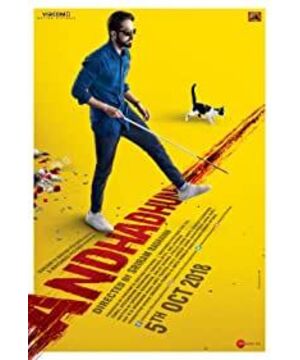After deliberating for a while, until Simi found this episode on the Akash Gate, it was a five-star recommendation. The urban legend that followed was a two-and-a-half-star level, and it was more appropriate to combine BGM and comedy bonuses.
The film is based on a French short film of the same name. There is no surprising reversal or particularly prominent shooting techniques in the short film. What makes it hot on the Internet is the "smart" setting of the script. In general murder stories, the core of the contradiction is either "find out the real murder" or "search for evidence". However, in the short film "The Tuner", the killer is known, there are sufficient witnesses, and the core of the contradiction is that "the tuner can get out of this house alive". As for the tuner's ability to escape, the key is neither hand-to-hand combat nor outwitness, but the psychological battle between him and the murderer. The tuner got involved in this case because he pretended to be blind (and was very proud of his acting skills and enjoyed the benefits of this deception), and the reason he was stuck at the crime scene was because he was in danger and still pretended Blind (otherwise a young man vs a middle-aged woman, if he fights meleely, he will most likely be able to subdue the murderer), he is determined to rely on his identity as a "blind" to escape danger and voluntarily give up other ways, cleverness is mistaken by cleverness, and "deceiving" for too long In the end, "self-deception" handed over his life to the murderer. The mockery and humor in the thriller is evocative and introspective. The freeze at the end echoes the sound of nail guns at the beginning of the film, but the unreal ending leaves enough room for the audience to discuss the game.
This film is literally a "long" film. It is necessary to give this story a clear ending. In this regard, the film confessed itself through Sophie's words - "Some works are better if they are not finished" (to the effect). Indeed, the ending of a drama, especially an Indian drama, should, of course, be to bring the criminal to justice (or die), and no matter how it is choreographed, it cannot be more interesting than the abrupt end of the original short film. So it is very important to have fun in the process.
In terms of expanding the story, the screenwriter has done a very delicate job. Instead of mushrooming at the first scene, it is better to use the "hypothesis" of writing the script - what if the male protagonist can't call the police after he escapes. Although the psychological warfare at the scene where Akash witnessed the murder was weakened, the "probing" drama was divided into two parts. First, the adulterer police who killed the first victim Plummer and Akash went home to carry out the first Round, and then Simi, who killed the second victim's neighbor, the old lady, went to Akash's house for the second round. Around the contradiction of "will the male protagonist be exposed", the story is fully stretched, and various tricks are played in the means of spying. One of the scenes where Simi wears a mask is the most classic scene in the whole film. I was startled and twitched with laughter.
However, this film called "The Tuner" should actually be called "The Pianist". Compared with the original short film, it is still somewhat lacking in structure and skills. First, the motives of the male protagonist for pretending to be blind are not fully explained, but only one or two strokes have been passed. Akash told Simi that he wanted to "write a better work". He also told Sophie that it was very affordable for him to live in a special rental house provided by the government for the disabled. In the film, he also mentioned several places where passersby died because of a Cash blindness took care of him. But these foreshadowings are not enough to support the first reaction of the male protagonist not to "escape" immediately after witnessing the body. The second is to let the audience see the murderer and the victim in advance. Not only that, but also deliberately filmed a scene where Simi's hands were covered with red sauce and hugged her husband to predict the murder after. The angle of the mirror that shows the corpse is not so impactful. The third is that the fatal "coating off" plot in the original short film was completely abandoned, the first climax of "Did she see the notepad" no longer exists, and the plot of the male protagonist entering the murder scene for the first time is relatively similar Not so gripping. Fourth, Akash was trapped in the facts and could not report the crime under the premise of knowing that the adulterer was a policeman. He did not have the self-imprisonment irony of "drawing the ground into a prison" like the Frenchman. The psychological portrayal of the male protagonist is insufficient, and the character's growth arc is also inferior to Simi, who was gradually inspired by the evil in her heart.
And most importantly: what the hell is a storyline that begins when Akash faints in the street! I feel like it's not the same movie before and after! ! The undercurrents, tension, and humor of the previous psychological warfare have all disappeared. From here, it begins to enter the dog blood of the Indian film, you bind me and I bind you, you kill me and I kill you. After Akash turned from false blindness to true blindness, the blind skills he used to practice didn't work for a dime (I thought at least one had to be arranged to go dark after a power outage, and he took advantage of his invisible but smart ears to counteract the The plot of killing), as for how a group of people kidnapped, blackmailed, and suspected each other, it was just a matter of the process, no details, simple and rude. For the last 40 minutes of watching the movie, I was in a mood of "Okay, I know that the male protagonist will kill him in the end, so how long do you guys want to delay the watering?" The Indian's obsession with the mystery of "the film must be two hours long" is almost devastating.
The film also leaves an ending that is supposed to be discussed by the audience. But I think it's still too straightforward. Akash persuaded the doctor not to kill Simi to get the liver, the character OOC. He, a blind man, knew that Simi had hit a rabbit. These were too obvious to say. He would blindly eat the snacks that Simi gave him before, which was originally an offering, and Akash relied on "swearing by Shiva" to retrieve his life from the doctor. Shiva is the god of destruction and also means rebirth (the chance of this god appearing in Indian films is too high...); the rabbit is a symbol of Easter, and often acts as a symbol of delusion or another world in European and American films (the most famous Certainly Alice in Wonderland and Mulholland Drive and Death Illusion).
That makes it clear that the ending that Akash told Sophie was false, and that he was indeed "reborn after a catastrophe". Then Akash was blind in the end, maybe he was blind in one eye.
The film gives a close-up of the rabbit at the beginning.
Its right eye is literally blind, while its left eye is intact with a barrier (similar to Akash's contact lenses). A poster of an actress was posted on the back of the tuk-tuk Ali drove, and the actress's posture was also blocking her right eye. This, of course, is a hint to the audience: the plot seen is half truth and half lies. Judging by the frankness of the film's use of visual symbols, it should mean that Akash is blind in one eye but not the other. At some point it came back clear. If you push it backwards like this, in fact, from the moment when Ali's mother and son tied him, he made up the story. Therefore, the fun that the audience can participate in is mainly "let's arrange and see what the truth should be like".
Finally, let me say that the subtitles have a great desire to survive. The film's dialogue has a small amount of English mixed in. When Sophie confronted Simi, she said Akash's "wild in bed" was translated as "vigorous", and Ali's mother gave Akash her phone to call her family and said "girlfriend or boyfriend" with subtitles It says "Girlfriend or Family". It's good and not vulgar at all.
View more about Andhadhun reviews











